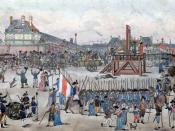The French revolution was a pivotal moment not just for France but it sparked a whole new system of thought throughout Europe and was a major stepping stone towards the worldwide spread of liberal democracy. However from the birth of the third estate with the Abbe Sieyes to the execution of Maximilien Robespierre 28 July 1794, the revolution would prove as controversial to historians as it was groundbreaking. The question of the motives and virtues of, ?the second terror? (1793-94) is one of those major controversies, which still reigns today. To answer the question of whether this second terror was imposed to simply defend the revolution against it?s many enemies both domestic and foreign, or if it was a bid to morally regenerate the French people, one can split this second terror again into two parts, the second terror of June-December of 1793 and the ?third terror? from January-July of 1794.
It can be argued that the this first period of terror arouse from the almost apocalyptic situation faced by the Convention in the summer of 1793 and that the need for a strong centralised government, which the terror undoubtedly provided, was essential. However the success of this strong government in preserving the state, also offered the chance of a return to a more liberal form of democracy. As a result of this not being availed of the defence of the ?third terror? becomes increasingly difficult and thus the blame for this period of brutality must fall on the shoulders of Robespierre and his colleagues? bid to morally regenerate the people of France. By June of 1703, ?the National Convention?, (the revolutionary government which came to power with the abolishment of the monarchy in February 1792) was in an extremely difficult situation. The most immediate threat was the imminent invasion...


